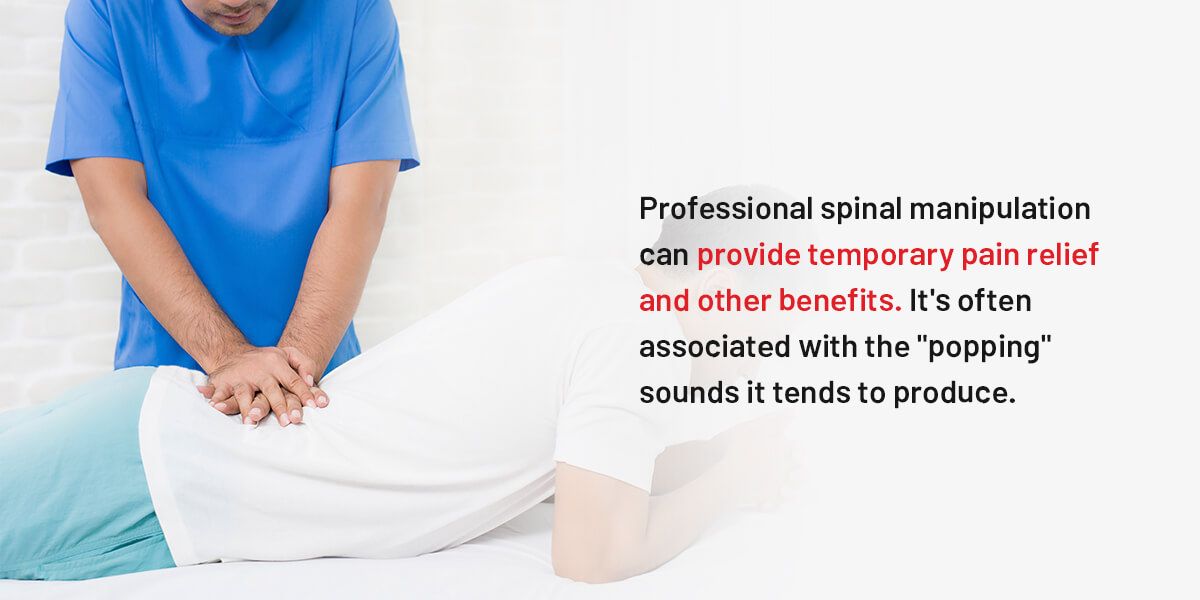
Several types of specialists can address back pain concerns and alleviate symptoms. Back pain has dozens of possible causes, which may be linked to trauma, aging or separate conditions. Many of those who suffer from back pain find chiropractic care beneficial. As a licensed health care professional, a chiropractor can help with back pain. In some cases, chiropractic care is not enough — a patient might need to see a spine specialist instead.
It’s essential to know when to see a chiropractor for back pain and when to see a spine specialist.
If you’re wondering whether or not a chiropractor is worth it, consider what chiropractors can and cannot do for back pain. A chiropractor can treat certain conditions causing back pain. In most cases, a chiropractor will address acute pain and stiffness.
Acute pain has an exact cause and is self-limited. For instance, if you tweak a nerve in your back while moving furniture, a chiropractor may be able to help relieve your pain. Many patients seek chiropractic adjustment after a sports injury, car accident or other instance of acute pain.
Chiropractors can help alleviate pain throughout your body. You might consider seeing a chiropractor if you:
While chiropractors provide effective treatment methods for many conditions causing back pain, other approaches may be necessary. Chronic pain often requires a different form of treatment. Persistent pain may be due to a herniated disc, spinal stenosis, vertebral fracture or other serious condition. In one of these instances, other minimally invasive treatment methods may prove most effective.
Consider alternative treatments if you:
In any of these instances, chiropractic treatment might not be the most helpful choice for you. You might need a different form of treatment to address the cause of your concern and reduce your pain.

The popping or cracking sound you might hear during spinal manipulation comes from something called joint cavitation. Your joints resist separation until they reach a critical point.
At that point, the lubricant inside your joints, a thick mixture called synovial fluid, has a bit more space to move around.
The extra room results in tiny gas bubbles. The creation of the gas cavity causes the popping sound you can hear.
Many people associate this popping sound with a feeling of relief. Although the sound itself is not necessary, the movements that create it can help adjust your joints.
A chiropractor uses small forces to realign your spinal joints. In the process, you might hear some cracking or popping sounds.
Cracking your back feels good because the movement that produces it realigns your joints and gives your muscles a stretch, which helps relieve any muscle-related stiffness.
Spinal manipulation might relieve your back pain, but it offers other benefits as well. Some of the reasons you might opt for chiropractic treatment include the following benefits:
Some may be wary about self-chiropractic exercises. A common myth is that cracking your joints will lead to arthritis, but the claim is untrue. Another claim is that chiropractic care will stunt a child’s growth, but that’s not true, either. Popping your joints is harmless most of the time — however, professional spinal manipulation is generally safer than self-chiropractic exercises. You may end up hurting yourself if you pop your joints too often or with too much force.
Some of the effects might include:
Given these possible side effects, performing self-chiropractic multiple times per day may not be the best idea. If you often experience pain or discomfort, speak with a professional about addressing the underlying cause. They might suggest one or more minimally invasive treatment methods to alleviate your symptoms.
Explore Stretches To Help Back Pain
Any treatment method has inherent risks, but professional chiropractic complications are uncommon. In rare instances, patients have experienced worsened herniated discs or compression of the spinal nerves. Of course, self-performed chiropractics are riskier since patients may apply too much force or adjust their joints too often. That’s why it’s best to see a licensed professional for chiropractic care.
Seeing a licensed professional minimizes the possible risks involved with chiropractic treatment. In order to practice, a chiropractor must earn a Doctorate of Chiropractic degree as well as a state license, which means about seven to eight years of postsecondary education. Throughout their education, a chiropractic professional learns about anatomy, physiology, biology and human health. To earn their license, they must pass the National Board of Chiropractic Examiners (NBCE) exam.
In other words, practicing chiropractors are trained individuals with the knowledge and experience to minimize health risks.
Some associate chiropractic care with developing arthritis. The association is a myth — seeing a chiropractor will not cause arthritis. Instead, chiropractors restore your joint alignment. Chiropractic care can help prevent or alleviate arthritis.
The term “arthritis” refers to a range of joint diseases and conditions, of which there are many different forms. They can result from aging, inflammation, trauma, infection, overuse or misalignment. One common form of arthritis is facet joint syndrome, which can cause pain and spasms. Because chiropractic treatment promotes joint realignment and strengthening, it may help prevent or reduce arthritis depending on its root cause. Since arthritis is a chronic condition, other treatment methods may be necessary.
How often you should see a chiropractor will depend on your unique needs and circumstance. You might have regular appointments once per week, once every other week or once per month. Following an injury, you may need several sessions during the first few weeks of treatment. Some patients may not have regularly scheduled chiropractic sessions — instead, they schedule a visit following a pain flare-up, however often that might be. The regularity with which you should see a chiropractor will depend on the nature and severity of your symptoms.
In some cases, you may have better results if you see a spine specialist instead of a chiropractor. Spine specialists understand the intricacies of the central nervous system. They can help you determine the underlying cause of your back pain, whether it’s a slipped disc, pinched nerve or arthritis. If necessary, they’ll handle any minimally invasive surgeries you might need to address the root cause of your back pain.
A few different instances may warrant seeing a spine doctor rather than a chiropractor. Consider consulting with a spine specialist if you’re experiencing chronic pain caused by a condition like osteoarthritis, which is unlikely to resolve with chiropractic care alone. You should also see a spine specialist for serious issues, such as fractures, joint dislocations, torn ligaments and nerve disruptions. Severe issues like these require expert input and careful evaluation.
A spine doctor can treat a wide range of spine-related issues. They’ll determine the least invasive ways to resolve your underlying problems or manage your pain. Some of the conditions a spine doctor can treat include:
Chronic back pain is highly common — up to 80% of people experience lower back pain at some point in their lives. The pain may be due to an underlying condition. It could include aching, shooting or burning sensations. A spine specialist can treat a wide range of conditions causing chronic back pain, including scoliosis, sciatica, joint dysfunctions or degeneration.
The discs between your vertebrae can deteriorate, tear or herniate. Disc-related issues can be a normal part of aging or a symptom of trauma. They often lead to lower back pain, as well as pain or numbness that travels through the limbs. A disc tear may cause pain, numbness or muscle spasms. A disc that slips or bulges out of place is called a herniated disc, and it causes severe pain.
If the lubrication between your vertebrae wears away, the bones rub together and cause pain. It’ll be difficult to move.
Since identifying the source of back pain can be tricky, failed surgeries are possible. You’ll need a specialist to determine the next steps after a failed surgery.
Stenosis describes the narrowing of the spinal canal or the tiny openings through which nerves travel, known as the foramina. Either condition may require therapeutic treatments or injections.
A spinal specialist can address pain wherever it’s located along your spine. You might see a specialist for any back or neck pain.
Vertebral fractures and pinched nerves, which often result from trauma, can cause severe pain. A spine specialist can help resolve the issue and relieve the pain.
Spinal issues related to the nerves, discs, joints and other parts of your anatomy can cause debilitating pain. In many cases, spine conditions require attention from a specialist, and chiropractic care alone will not be enough to address the issue’s root cause.
Learn More About Potential Spine Conditions
If you experience acute or chronic back pain, you know the effects it can have on your everyday life. Seeking relief from your pain may lead you to either a chiropractor or a spine specialist. Spinal manipulation through chiropractic care could offer relief from pain, which has many benefits. It may help you rely less on painkillers, improve your posture, experience fewer headaches or migraines and build your strength. If you are generally healthy but experiencing acute back or neck pain, a chiropractor might help alleviate your pain.
If you’re experiencing chronic pain caused by an issue such as joint disease, osteoporosis or osteoarthritis, you may want to see a spine specialist rather than a chiropractor. It’s also best to see a spine specialist in the case of severe injury or trauma, such as a fracture or a herniated disc. If you need a spine specialist to identify and address your back pain, consider the Desert Institute for Spine Care (DISC).
At DISC, we offer treatment for various spine conditions. We strive to provide outstanding and compassionate care in the form of nonoperative or minimally invasive procedures. We utilize the most innovative and effective treatments so you can restore an active lifestyle. If you’re experiencing back pain, schedule an appointment with DISC today.
Visit Here to Schedule An Appointment